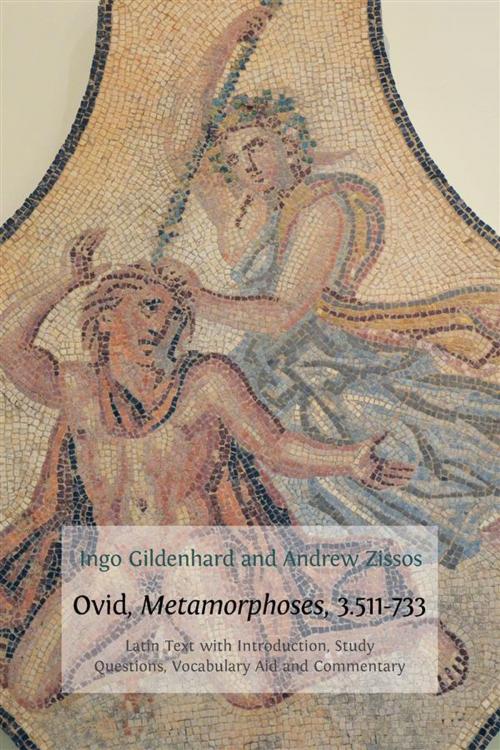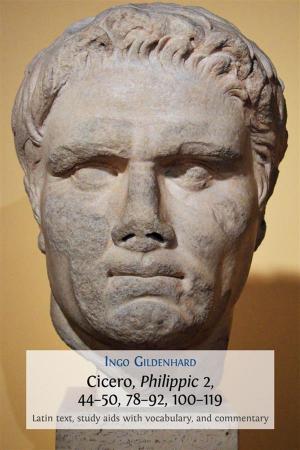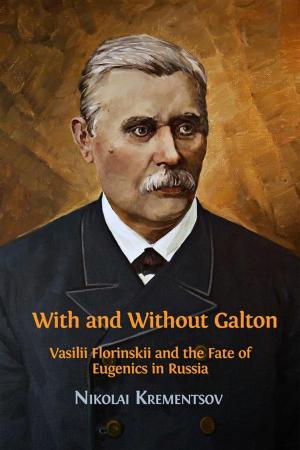Ovid, Metamorphoses, 3.511-73
Latin Text with Introduction, Commentary, Glossary of Terms, Vocabulary Aid and Study Questions
Fiction & Literature, Literary Theory & Criticism, Ancient & Classical, Poetry History & Criticism| Author: | Ingo Gildenhard and Andrew Zissos | ISBN: | 9781783740857 |
| Publisher: | Open Book Publishers | Publication: | September 5, 2016 |
| Imprint: | Language: | English |
| Author: | Ingo Gildenhard and Andrew Zissos |
| ISBN: | 9781783740857 |
| Publisher: | Open Book Publishers |
| Publication: | September 5, 2016 |
| Imprint: | |
| Language: | English |
This extract from Ovid's 'Theban History' recounts the confrontation of Pentheus, king of Thebes, with his divine cousin, Bacchus, the god of wine. Notwithstanding the warnings of the seer Tiresias and the cautionary tale of a character Acoetes (perhaps Bacchus in disguise), who tells of how the god once transformed a group of blasphemous sailors into dolphins, Pentheus refuses to acknowledge the divinity of Bacchus or allow his worship at Thebes. Enraged, yet curious to witness the orgiastic rites of the nascent cult, Pentheus conceals himself in a grove on Mt. Cithaeron near the locus of the ceremonies. But in the course of the rites he is spotted by the female participants who rush upon him in a delusional frenzy, his mother and sisters in the vanguard, and tear him limb from limb.
The episode abounds in themes of abiding interest, not least the clash between the authoritarian personality of Pentheus, who embodies 'law and order', masculine prowess, and the martial ethos of his city, and Bacchus, a somewhat effeminate god of orgiastic excess, who revels in the delusional and the deceptive, the transgression of boundaries, and the blurring of gender distinctions.
This course book offers a wide-ranging introduction, the original Latin text, study aids with vocabulary, and an extensive commentary. Designed to stretch and stimulate readers, Gildenhard and Zissos's incisive commentary will be of particular interest to students of Latin at AS and undergraduate level. It extends beyond detailed linguistic analysis to encourage critical engagement with Ovid's poetry and discussion of the most recent scholarly thought.
This extract from Ovid's 'Theban History' recounts the confrontation of Pentheus, king of Thebes, with his divine cousin, Bacchus, the god of wine. Notwithstanding the warnings of the seer Tiresias and the cautionary tale of a character Acoetes (perhaps Bacchus in disguise), who tells of how the god once transformed a group of blasphemous sailors into dolphins, Pentheus refuses to acknowledge the divinity of Bacchus or allow his worship at Thebes. Enraged, yet curious to witness the orgiastic rites of the nascent cult, Pentheus conceals himself in a grove on Mt. Cithaeron near the locus of the ceremonies. But in the course of the rites he is spotted by the female participants who rush upon him in a delusional frenzy, his mother and sisters in the vanguard, and tear him limb from limb.
The episode abounds in themes of abiding interest, not least the clash between the authoritarian personality of Pentheus, who embodies 'law and order', masculine prowess, and the martial ethos of his city, and Bacchus, a somewhat effeminate god of orgiastic excess, who revels in the delusional and the deceptive, the transgression of boundaries, and the blurring of gender distinctions.
This course book offers a wide-ranging introduction, the original Latin text, study aids with vocabulary, and an extensive commentary. Designed to stretch and stimulate readers, Gildenhard and Zissos's incisive commentary will be of particular interest to students of Latin at AS and undergraduate level. It extends beyond detailed linguistic analysis to encourage critical engagement with Ovid's poetry and discussion of the most recent scholarly thought.















